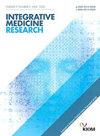草药作为抗精神病药物对精神分裂症谱系障碍伴抑郁患者的疗效:一项系统回顾和荟萃分析
IF 3
4区 医学
Q2 INTEGRATIVE & COMPLEMENTARY MEDICINE
引用次数: 0
摘要
抑郁症是精神分裂症谱系障碍(SSDs)的常见合并症,影响功能结局和生活质量。本系统综述和荟萃分析评估了草药作为抗精神病药物辅助治疗ssd合并抑郁症患者的有效性。方法检索8个数据库,从建立到2025年1月,随机对照试验(rct)评估草药联合抗精神病药物与单独抗精神病药物对ssd合并抑郁症患者的影响。主要结局指标是抑郁症特异性评估工具。使用Cochrane RoB 2工具评估偏倚风险,使用GRADE评估证据确定性。结果12项随机对照试验共纳入884名受试者。与抗精神病药物相比,联合治疗显著改善了抑郁症状(标准化平均差[SMD] -0.91, 95%可信区间(CI) -1.05 ~ -0.76, p<0.00001, N=10, N= 768,中等确定性),增强了精神分裂症症状的疗效(SMD -0.60, 95% CI -0.89 ~ -0.31, p=0.0014, N=9, N= 666,中等确定性),并显示出更高的缓解率(相对危险度[RR] 1.26, 95% CI 1.04 ~ 1.52, p=0.0277, N=5, N= 372,低确定性)。不良事件发生率组间差异无统计学意义(RR 1.18, 95% CI 0.69 ~ 2.01, p=0.1609, N=2, N= 136,低确定性)。结论本综述提供的证据表明,草药作为抗精神病药物的辅助药物,可以改善ssd合并抑郁症患者的抑郁和精神病症状。虽然有希望,但方法上的局限性和研究的独家中国来源表明需要更严格和多样化的试验来建立明确的临床建议。协议注册号prospero, CRD42025643148。本文章由计算机程序翻译,如有差异,请以英文原文为准。
Effectiveness of herbal medicine as an add-on to antipsychotics in patients with schizophrenia spectrum disorders accompanied by depression: A systematic review and meta-analysis
Background
Depression is a common comorbidity of schizophrenia spectrum disorder (SSDs) that affects functional outcomes and quality of life. This systematic review and meta-analysis evaluated the effectiveness of herbal medicine as an adjunct therapy to antipsychotics in patients with SSDs and comorbid depression.
Methods
Eight databases were searched from inception to January 2025 for randomized controlled trials (RCTs) evaluating herbal medicine combined with antipsychotics vs antipsychotics alone in patients with SSDs and comorbid depression. The primary outcome measure was a depression-specific assessment instrument. Risk of bias was assessed using the Cochrane RoB 2 tool, and evidence certainty was assessed using GRADE.
Results
Overall, of 12 RCTs, 884 participants were included. Compared to antipsychotics, combination therapy significantly improved depressive symptoms (standardized mean difference [SMD] –0.91, 95 % confidence interval (CI) –1.05 to -0.76, p<0.00001, N=10, n=768, moderate certainty), enhanced efficacy for schizophrenia symptoms (SMD –0.60, 95 % CI –0.89 to -0.31, p=0.0014, N=9, n=666, moderate certainty), and showed higher response rates (relative risk [RR] 1.26, 95 % CI 1.04 to 1.52, p=0.0277, N=5, n=372, low certainty). Adverse event rates showed no significant difference between groups (RR 1.18, 95 % CI 0.69 to 2.01, p=0.1609, N=2, n=136, low certainty).
Conclusions
This review provides evidence that herbal medicine, as an adjunct to antipsychotics, may improve both depressive and psychotic symptoms in patients with SSDs and comorbid depression. Although promising, methodological limitations and the exclusive Chinese origin of the studies indicate the need for more rigorous and diverse trials to establish definitive clinical recommendations.
Protocol registration
PROSPERO, CRD42025643148.
求助全文
通过发布文献求助,成功后即可免费获取论文全文。
去求助
来源期刊

Integrative Medicine Research
Medicine-Complementary and Alternative Medicine
CiteScore
6.50
自引率
2.90%
发文量
65
审稿时长
12 weeks
期刊介绍:
Integrative Medicine Research (IMR) is a quarterly, peer-reviewed journal focused on scientific research for integrative medicine including traditional medicine (emphasis on acupuncture and herbal medicine), complementary and alternative medicine, and systems medicine. The journal includes papers on basic research, clinical research, methodology, theory, computational analysis and modelling, topical reviews, medical history, education and policy based on physiology, pathology, diagnosis and the systems approach in the field of integrative medicine.
 求助内容:
求助内容: 应助结果提醒方式:
应助结果提醒方式:


